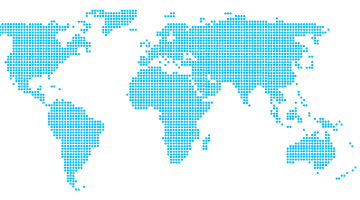Actionable global business intelligence is vital to our members during these uncertain times. AMT’s Global Tech Centers will supply updated information from their regions regarding new opportunities as well as status reports on local manufacturing facilities that utilize your products. This is the first installment in a series.
Mexico
Mexico announced a synchronized re-opening of automotive facilities to gear up the supply chains in North America to prepare for the U.S. auto industry re-opening.
COVID-19’s effect on Baja California’s aerospace industry should be minimal.
The Richard Group is starting a new mining operation valued at $90 million in the state of Coahuila in northern Mexico.
Taigene has just begun manufacturing electric motors for motorcycles in Leon City in the central Mexico region.
The GM plant in Toluca, Mexico will produce 9 million face masks in six months, and the Volkswagen plant in Puebla, Mexico is planning to manufacture ventilators.
Hitachi Cable will expand their Queretaro facility. The ramp-up of the facility where they manufacture brake system hosing will be ready by the third quarter of 2020.
The Navistar facility in Monterrey, Mexico never stopped production during the sanitary emergency declared in Mexico but is currently facing issues with the supply chain, which is critical to maintaining production at the 2,000-person factory.
The Mexican Auto Parts Manufacturers’ Association (INA), shared with AMT Mexico that they are working with the federal government to open the 1,400 facilities of their members.
The Mexican Association of Mold and Die Manufacturers shared with AMT Mexico that most of their 70 members have strong orders and backlogs as many of the mold and die shops are being retrofitted or upgraded in preparation for resuming operations in mid-May.
Brazil
Collaboration between engineering and technical schools within different segments of the industry (automotive, ag equipment, die and mold shops, etc.) are ramping up the design and mass production of lower-cost medical equipment and supplies needed to fight COVID-19.
37 of 65 automaker plants are closed and committed to producing medical products to help fight COVID-19. To name a few: Fiat Chrysler, Mercedes-Benz, BMW, and GM. 3D printers have been used to produce parts for ventilators. Operations will be focused on the production of these items for now.
Industrial manufacturing workers will have their hours and wages reduced by 25%. Employees who agree to a salary reduction will receive six months of guaranteed employment.
Due to an excellent crops year and credit lines to the farming industry, investments are taking place in ag equipment and freight vehicles. Members who do business with CNH, Volvo, Caterpillar, John Deere, and their suppliers should be on the lookout for eventual opportunities.
Brazilian airlines canceled 95% of their domestic flights.
The devaluation of the Brazilian real in relation to the U.S. dollar (1 USD = 5.2 BRL) will make imports more expensive and will make Brazil exports a lot more competitive. This should boost local manufacturing.
The state of São Paulo is the area most affected by COVID-19, and its economy is sliding. The state represents 65% of Brazilian GDP.
China
The BMW plant in Shenyang city, in the Liaoning province, returned to a 2-shift-per-day production schedule. Furthermore, BMW has decided to invest an additional $3.25 billion for a new plant to be completed in 2022.
In early April, the China Construction Machinery Association (CCMA) reported that major manufacturers, including Sany Group, ZoomLion Heavy Industry, Liugong Group, Xuzhou Construction Machinery Group (XCMG), Shandong Lingong Construction Machinery (SDLG), will speed up key components’ localization (chassis, engine, high pressure hydraulic parts) to support “new infrastructure” projects, including railroad transportation, an investment of $71 billion.
FAW Hongqi New Energy Vehicle Co. (Red Flag) in Changchun city in the Jilin province announced that they started an investment of $1.11 billion to build a brand new facility to produce battery electric vehicles (BEV) and intelligent connected vehicles (ICV) with an annual output of 200,000 units after the completion of their facility in 2022. Hongqi is a well-known brand in China.
Toyota announced its fourth production line at GAC Toyota (Guangzhou, in southern China) is going to be built to only make electric vehicles (EV) with a total investment of $712 million. Production capacity will be 200,000 units annually. Additionally, the fifth production line with an investment of $905 million will be completed in 2022 to produce two models of SUVs and one model of MPV. Total annual production will be 200,000 units, which will increase Guangzhou Toyota’s production capacity from the current 600,000 units to 1 million units.
FAW Toyota (with headquarters in Changchun, in northeast China) is planning to build a brand-new factory in Tianjin (near Beijing) to produce a new energy vehicle with an annual production capacity of 200,000 units. The total investment will be $1.21 billion. The vehicle will be a TNGA (Toyota New Global Architecture) concept product and also an EV.
Europe
There are 309 automobile assembly and production plants in Europe, 137 for passenger cars, 37 for LCV, 59 for HDV, 47 for buses, 72 for engines. The pandemic has virtually wiped out demand for new vehicles in Europe and North America, pushing automakers to temporarily halt most production, leaving them needing cash. Those manufacturers, including Toyota and Nissan, are seeking funds from Japanese mega-banks and the Japan Development Bank.
Toyota decided to temporarily shut down all Toyota assembly plants in Europe starting March 23. It will not stop activities that are important to secure mobility wherever needed, such as shipping service parts to European markets to keep vehicles on the road.
Working groups at Fiat Chrysler Automobiles and Peugeot's owner, PSA, are speeding up work on closing their merger deal despite the coronavirus crisis, PSA CEO Carlos Tavares said .
Audi plans to resume engine production in Hungary to build up inventory for its European car plants.
Romanian Dacia (Renault Group) plans to restart output soon.
The electric car market saw record growth across Europe in the first two months of 2020. One of each 15 cars sold in Germany in February was an EV, amounting to a record 7% of new sales. France recorded a 9% sales share, similarly to Italy and Spain. If the present closures remain short term, electric car production will not be majorly affected.
European aeronautics, space, defense, and security industries represent over 3,000 companies in Europe; 17 of them are major companies. These companies are maintaining some level of production but have implemented sanitary measures while allowing white collar employees, if possible, to work from home. Companies across the industry are bolstering balance sheets and shoring up liquidity.
Rolls-Royce has significantly reduced all but essential activity within its U.K. civil aerospace facilities. Considered essential, its defense business will remain operational and will continue to supply and support the engines that power military aircraft, naval vessels, and other vehicles – many of which are being called upon to assist the relief effort.
Russia has largely maintained the level of production at its factories of various sectors, while the quarantine measures have only affected the administrative staff. The country has not shown major demand reductions. Steel consumption dropped 3% while the rest of Europe saw a reduction of 10%.
India
The lockdown system adopted by the Indian government is based on a color grading of the nation’s regions into red, orange and green zones based on the severity of existing COVID-19 cases and its likelihood of spreading in the future. While the red zone would continue to observe strict isolation, the orange and green zones would see controlled relaxation, allowing for the return of agricultural and certain manufacturing activities under social distancing rules. The industries likely to get the go ahead to employ the minimum manpower on a single shift basis would include: heavy electrical equipment; telecom equipment and component units; automotive units; steel and ferrous alloy mills; spinning mills an power looms; defense; cement plants; pulp and paper units; fertilizer plants; food and beverage; plastic manufacturing units, etc. https://www.bloombergquint.com/coronavirus-outbreak/covid-19-pandemic-india-considers-opening-some-industries-amid-lockdown
India’s largest carmaker, Maruti Suzuki, is planning to manufacture around 10,000 ventilators per month. https://economictimes.indiatimes.com/news/company/corporate-trends/maruti-suzuki-to-help-produce-ventilators-masks-and-protective-equipment-to-fight-against-covid-19/articleshow/74859601.cms?from=mdr







